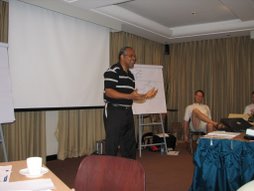The Parable of the Talents
Matt 25:14 ff
Today, we want to take yet another look at the parable of the talents. It is doubtful any new slant can be found. However, I want to bring focus to some areas of thought.
I want to start by looking more closely at the person who was given the 5 talents.
The point we want to make about this is that he did not become complacent because of his good fortune. Success sometimes inspires people to push toward even greater achievement. However, all too often, some people choose to rest on their laurels. They become complacent and lose their drive and their edge.
From my perspective, there is a marked tendency for professing Christians to embrace complacency and to lose the fire to be the best that they can be. This applies not only to their role in the Lord’s vineyard but also to how they lead their secular lives.
Today, I want to invite you to diligently conduct some self-analysis.
Could you honestly say that you have been producing a 100% return on God’s investment in you in your spiritual life?
When you look back to where you were when you became a Christian, what kind of growth have you shown?
What is it that you could put on the table as evidence that you have added value spiritually over time?
On another front, there is great caution in the brotherhood about discussing matters related to the material successes of Christians. It seems to be an unwritten rule that Christians are to mute discourse about their material gains.
How often have you heard a responsible preacher challenging hearers about the rate of return that they have been producing materially from God’s investment in them?
Why do we assume that God is not expecting high returns in material terms on the talents that we have been given?
Consider the fact that the Christian mission is to take the Gospel to all the world. Is there some way that this could be achieved without significant material resources? Where are those resources to come from?
If Christians fail to try to achieve high returns on God’s talents materially is that not effectively limiting or even sabotaging the mission?
Today, I want to ask that you re-consider what it is that you have been doing with the talents that God has given to you.
What more do you have to do in order to feel that you are producing 100% returns on that investment? What are the opportunities that have been open to you that you have let pass by? Are there areas in which you could do more if you extended yourself a little more?
Are you guilty of not putting enough energy into your daily activities? Have you given up on things without even really trying?
Are you achieving less than you should because of self-doubt and negative thinking?
Are you hamstrung because of limiting thoughts about your age, or gender, or education or family background?
“I can do all things through Christ who strengthens me” Phil 4:13 makes a lie of all negative thoughts. Also Matt 21:22 “And whatever things you ask in prayer, believing, you will receive.”
This is a call for us to wake up to the need to maximize the returns on God’s investment in us. No excuses! The persons who got the commendation: ‘Well done, good and faithful servant; you have been faithful over a few things, I will make you ruler over many things. Enter into the joy of your lord.’ delivered 100% on the investment.
We now want to turn our attention to the anatomy of the buried talent.
24 “Then he who had received the one talent came and said, ‘Lord, I knew you to be a hard man, reaping where you have not sown, and gathering where you have not scattered seed. 25 And I was afraid, and went and hid your talent in the ground. Look, there you have what is yours.’
My attention is drawn to the mindset of the person who received the talent. Here was someone who was blessed with an opportunity for growth. Yet his outlook was so negative that he thought that the best thing to do with the talent was to bury it. We have been emphasizing how important our outlook on life is to how it unfolds for us. This man was so negative that he could not get beyond his perceptions, fears and doubts.
Most of us have some lingering areas of negative thinking. These thoughts limit our progress and place a cap on what we are able to achieve. Some persons are totally overrun by their negative view of life. They condemn themselves to failure or mediocrity at best. Like this servant they somehow manage to snatch defeat from the jaws of victory. Given the chance to win they create ways to fail.
Take a moment to reflect on your outlook on life.
Are you usually expecting things to turn out well or do you usually feel that no matter how rosy things might look on the surface some dark clouds will appear?
Do you have a sense that in the main things have not gone well in your life?
Do you wake up with excitement expecting that great things are going to happen to you today or Do you start your days wondering what is going to go wrong today?
It is impossible to be the best that you can be if you constantly harbour negative thoughts. Positive growth thrives on positive thoughts.
We should also notice that the servant misread his master. He came to a decision about his master and how to please him that was badly skewed. Some of us blight our development by misunderstanding others. We consistently misread people and do things that torpedo our relationships.
Social intelligence is one of the keys to success in life. We need to work actively at development our capacity to relate effectively with other people. The idea that we do not care about making friends and that we are willing to be lone rangers is not conducive to achieving high returns on God’s investment in us. That mentality is directly in line with the philosophy of burying the talent.
If we are to do justice to God’s investment in us we need to engage the support of others and we need to proactively collaborate with others. It is difficult to understand how we can honour the need to love our neighbour as ourselves if we are estranged from them.
Today, the challenge is for each of us to work hard at getting on better with people. We need to put ourselves in a position to use our people skills to add value and to increase the returns on God’s investment in us.
Finally, the servant was AFRAID. Fear is a crippling emotion. We can take encouragement from Paul’s admonition to Timothy “For God has not given us a spirit of fear, but of power and of love and of a sound mind”. 2 Tim 1:7
But back to the emotion of being afraid. Hear Daniel Lieberman - Get Anyone to do Anything: “It is in our nature as human beings to seek affiliation, to make friends, and to care about others. But sometimes it can be hard for a person to reach out and “expose” his or her true feelings. Most people want to like, want to love, want to connect, but they are AFRAID. Things get in the way of their innate desire, things like fear of rejection, vulnerability, ego and jealousy are but a few of the multitude of mixed emotions, attitudes, and beliefs that keep us from reaching out and bonding with others.”
I want to take time today to recount some basic psychological techniques outlined by Lieberman that are geared to simply influence a person’s natural state to emerge. Since it is natural for us to feel good when we give, when we love and when we help, the objective is to bring the submerged desires to the surface. It is not about manipulation of self or others.
What this is about is working to apply certain psychological principles and methodologies to bring out and develop a natural chemistry with others. The plan is to examine the traits and qualities that arouse feelings of friendship and likability.
We will explore 9 psychological laws and phenomena that affect, influence and alter what we think of someone so you can get anyone to like you.
1 Law of Association
If you want to be liked by a person, try being in communication with them when they are in a good mood or excited about something. Those feelings will be anchored and associated with you and the person is likely to have positive feelings toward you.
2 Repeat exposure
The greater the exposure, the more positive the response. Research by Moreland and Zajonc (1982) suggested that repeated exposure to any stimulus leads to a greater appreciation and liking (as long as the initial reaction is not negative). This is true of anything – a person, a place, or even a product. Advertisers know that and exploit it.
3 Reciprocal Affection
Countless studies (and common sense) have established that we tend to like more those who like us. When we find out that someone thinks well of us, we in turn are unconsciously driven to find him or her more likeable as well. “I appreciate you because…”
4 Similarities
Like attracts like. We are drawn to people who are similar to us, have similar interests or even similar experiences. It is the similarities and commonalities that generate mutual liking (even when there might be significant differences between the persons.)
5 How you make others feel
How someone feels about you is greatly determined by how you make them feel about themselves. Being the kind of person who makes people feel good will go a long way toward their finding you likeable.
6 Rapport
Rapport creates trust, allowing you to build a psychological bridge to others. The idea is to be “ín sync”. You may have noticed that family members, spouses, and close friends display a number of similarities in their mannerisms. That is so because we are driven to like a person if they “appear as we do.”
Key tip is to match posture, movements and speech.
7 Help them out
Studies in human nature show us that people dislike others more after doing them harm. This is in an attempt to reduce dissonance. Cognitive dissonance theory indicates that we feel uneasy when we do something that is inconsistent with how we see ourselves. Therefore to reduce this inner conflict we rationalize our actions to remain consistent with our self-concept. So when we hurt someone we seek to justify it by rationalizing that we really do not like them and they deserve it. The alternative is to accept that we are bad or careless and that cannot be so.
The reverse is also true. When we do someone a favour we are likely to have positive feelings toward them. So one key would be to have others do you a small favour as that will generate kind and warm feelings toward you.
The implications are there for being more open and willing to share the challenges that you are facing and also being more receptive of assistance from others. Allowing others to do something for us works to make us more likeable. In a sense, receiving kindness is more important than being kind in getting someone to like you.
The other implication is that if there are frequent and broad-based incidents of people helping people then inevitably you are going to end up having someone do something for you and have them produce positive feelings toward you.
8 He’s only human
Seeing someone you admire do something stupid or clumsy will make you like them more (Aronson, Willerman and Floyd 1966). While we like confident and self-assured people, we like people who do not take themselves too seriously. They should be willing to laugh at their own mistakes and to let others know that they are human. Remember Columbo?
9 Positive attitude
Nobody wants to be around a moody, angry and pessimistic person – even if that is how you are!
We all admire and want for ourselves a positive, happy outlook and perspective on life. Consequently, we are drawn to that attitude and to people who have it.
It may be true that misery likes company and that people who feel miserable might enjoy sharing their troubles with others who are feeling the same. That does not mean that they like those persons. Also, as soon as they hit a positive mood they seek to distance themselves from the bearers of doom and gloom.
So, those are the 9 principles that enhance our ability to maximize the returns on God’s investment in us – through better relations with others.
We have a responsibility to be mindful of the talents with which God has endowed us. We can produce positive gains on them and get the Well Done commendation or we can do little or nothing with them and face condemnation instead of commendation.
We should also strive to maximize the returns on the investment in us. We have to be the very best that we can be. This includes spiritual as well as material development.
We should also be aware of the fact that it is not possible to be the best that we can be without being effective in relating to others. Give attention to the 9 principles that will help us function better with others.
These are messages that I have shared with various audiences. I hope you find a blessing here. Often we are so caught up in life and its challenges that we fail to take time out to ponder issues that go to the very core of our existence. As we grapple with the stresses of our daily living we seek answers. All too often we do not find them. I might not have answers but you will find solace and a source of peace from the Cold Plate menu or day's serving. God bless you!
About Me
- Trevor E Smith
- Jamaica
- I am committed to the process of human capacity development. I believe that spiritual development is central to the fulfilment of our purpose on earth. I share food for thought as a lay presenter for the Church of Christ in Jamaica and as a facilitator of workshops for the INFOSERV Group. I am a member of the St. Andrew Church of Christ.
Your Soul Food Chef

Pictures cover 1000 words...they can also deceive...Trevor Cook????
Extended DISC World Meeting

Here I am in familiar situation in far away Thailand
Related Kitchens
- Team Building Clinic
- Success with People Academy
- Success with People
- Keri's Blog
- INFOSERV ONLINE
- INFOSERV Institute of Technology...education and training
- Extended DISC Caribbean...solutions for managing people and organizations
- D-I-S-C Movie Clips
- CareerGuideOnline...serious career interest inventory
Wisdom
Proverbs 23:12
Apply your heart to instruction and your ears to words of knowledge
Apply your heart to instruction and your ears to words of knowledge
Partners for Life

Trevor & Althea
Fiddy and Dela

The canine members of the household
Offspring visiting South Africa

Tessa, Tamii, Keri
INFOSERV


Why bother about God?
nOur children carry a part of us.
nWe are concerned about them.
nOur concern is not dependent on what they do.
nNo matter what, they are still our children.
n
No comments:
Post a Comment